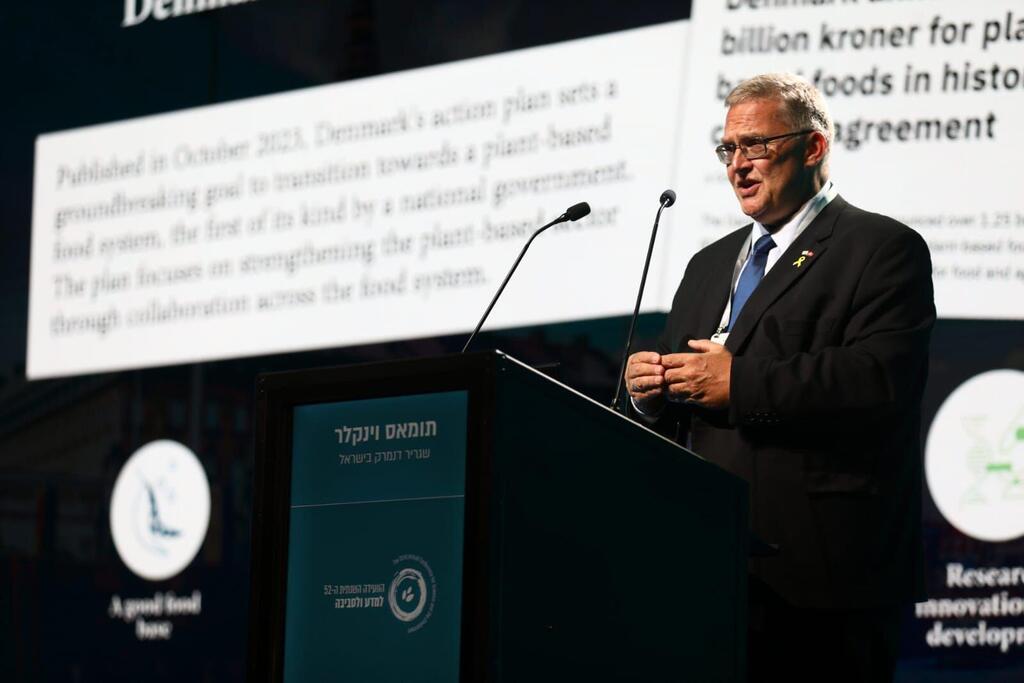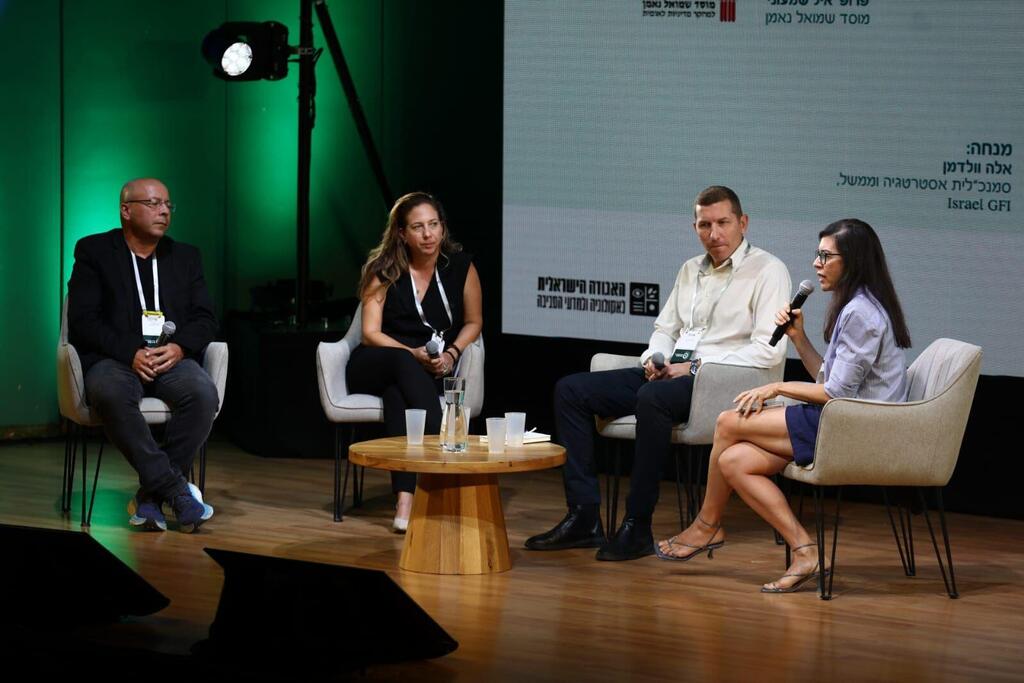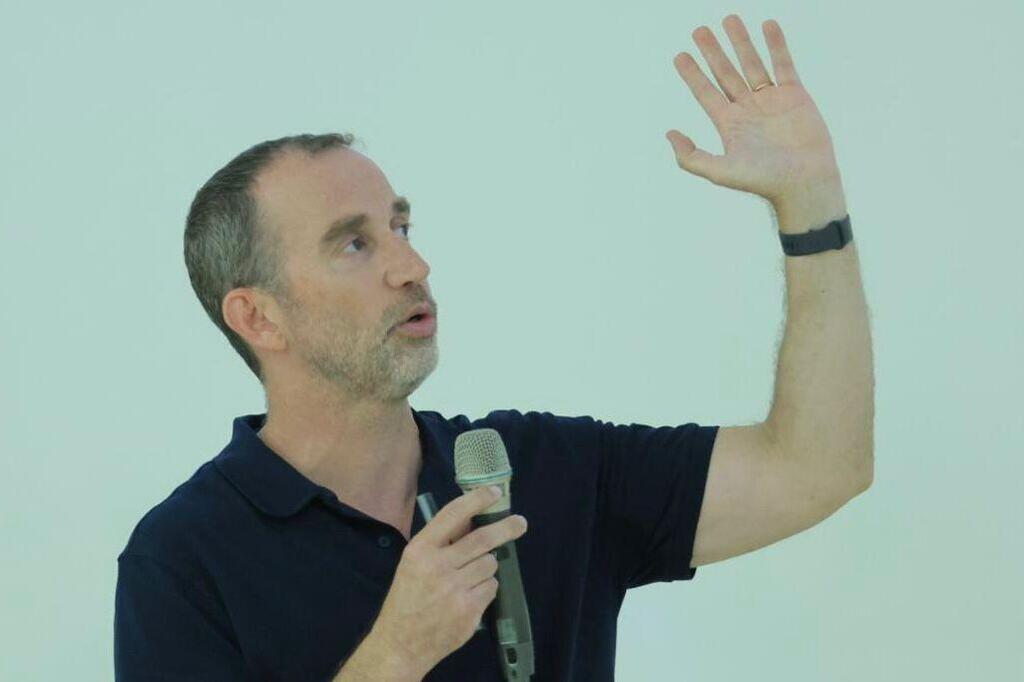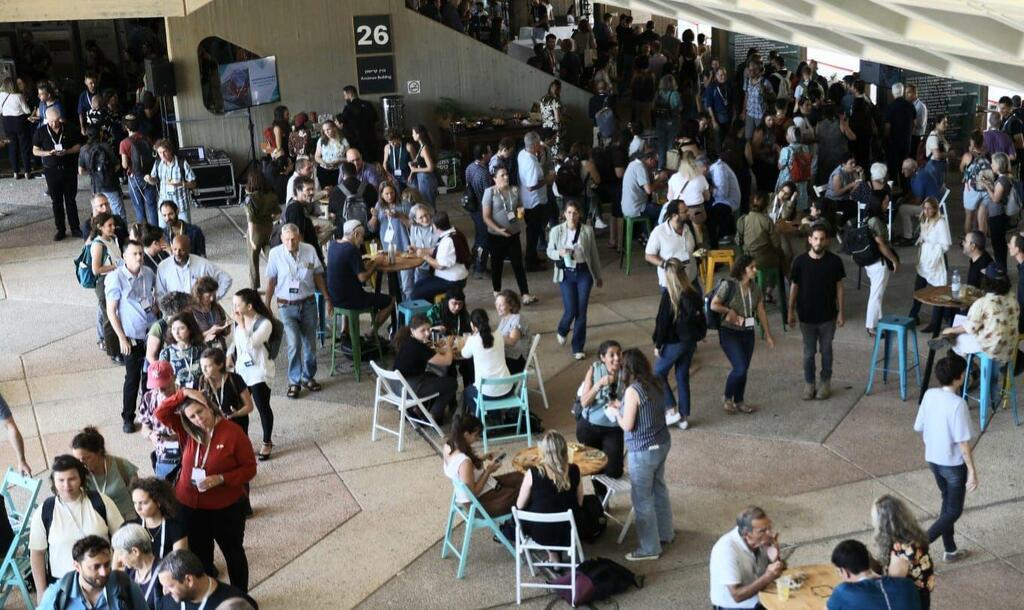Getting your Trinity Audio player ready...
The first day of the 52nd Annual Conference for Science and the Environment concluded with a festive ceremony where Prof. Moshe Shachak, one of the most influential researchers in the field of ecology and environmental sciences in Israel, both past and present, received a lifetime achievement award.
His research is considered groundbreaking on an international scale, especially his study on snails in the Negev, which Shachak conducted alongside other researchers. In this research, the term "ecosystem engineers" was coined, referring to species in nature that shape their environment, thereby impacting the ecosystem and the landscape.
5 View gallery


Prof. Moshe Shachak receives a lifetime achievement award at the 52nd Annual Conference for Science and the Environment
(Photo: Lior Mizrahi)
Protein consumption habits
The final day of the conference began with participants rising early for a mindfulness workshop and animal tracking and bird tagging tours in the host city of Be’er Sheva. The morning plenary featured a panel discussing the issue of strengthening national food security, with the participation of Denmark's ambassador to Israel, Thomas Winkler. In his remarks, he emphasized that he represents "a wealthy country, and agriculture and food production are an important part of the Danish economy."
However, given the vulnerability posed by wars and climate change, Denmark’s economy must develop and innovate, relying on science, innovation and collaboration, particularly with Israel. "This is critical for Denmark, and also for Europe. We cannot do it alone. Israel is a natural partner for us." Thus, the ambassador called for collaborations in the field of alternative food, presenting Denmark and Israel as small yet important nations for global change in the field.
"We in Israel lead in veganism rates but also in poultry and beef meat consumption rates," said Ari Ben Dror, VP of Sustainability and Operations at GFI Israel (the Israeli branch of The Good Food Institute, a research institute focused on alternative proteins and the promotion of a healthy, sustainable and humane food system).
"Animal-based food production is inefficient; we waste calories raising animals to get fewer calories when consuming their meat," added Nir Goldstein, GFI Israel's CEO. According to him, "Wars, climate events, animal pandemics and human pandemics are scenarios that could disrupt the continuous supply of protein."
Goldstein said that beef and fish are at high risk because we rely on imports. Meanwhile, Israel ranks second globally in innovation in the alternative protein sector, offering potential for a successful change.
Jon Bateman, co-director of the Technology and International Affairs Program at the Carnegie Endowment for International Peace, spoke with Galit Cohen from the Institute for National Security Studies (INSS) about the importance of alternative proteins for food security. "Alternative proteins can potentially create a world where a greater amount of food can be produced domestically with less arable land, and also potentially a shorter and more secure food supply chain," he said.
"Food security is national security. The more we can invest in technologies that can alleviate the overall regional pressure on scarce resources like water and land, the more that we can create the necessary conditions to start to create a more stable regional security architecture."
Ma'ayan Laufer from YS Growth Strategies presented an international overview of governmental actions on food security issues. According to him, food systems encompass three challenges: reducing environmental impact, ensuring fair livelihoods, and promoting food security. "In Israel, the population grows by 2% annually," he noted, explaining that this puts pressure on food production.
After mapping the policy tools worldwide and examining their effectiveness in Israel, he argued that we are at a strategic decision point: "What do we want? Full self-reliance or trade partnerships?"
Another panelist, Prof. Yaakov Nahmias, a cultured meat researcher from the Hebrew University and founder of Believer Meats, stated that when discussing global problems, we often focus on greenhouse gas emissions, but that’s not necessarily agriculture's main issue. The real challenge is the expected 150% rise in meat consumption, as well as the shortage of resources like water needed for agriculture to supply meat to humanity.
"Thus, cultured meat is a technology meant to break the barrier and produce meat we’ll want to eat – the first hamburger produced 10 years ago cost $2 million per kilogram. We’re talking about production on a scale similar to organic chicken farming in the U.S., but with much less land and water required," he said. "Meanwhile, we need crops that provide protein. Soy is a suitable crop for this, and it should be introduced to Israel."
"Today, 20% of the dairy in Israel comes from alternative milk, and it's time to do the same with meat," said Ella Waldman, VP of Strategy and Governance at GFI Israel, who led a panel on cross-sector dialogue in food security.
According to Yuval Lipkin, Head of the Food Security Administration at the Agriculture Ministry, cross-sector synergy is a significant and long process, and that’s where we’re headed. When every ministry focuses only on what it wants, it’s a problem. Now, for the first time, it’s a holistic process involving the public, business, and third sectors. "Everyone is looking out for the country’s best interests. We can make a 25-year plan. R&D (research and development), local agriculture, and long-term thinking are crucial," he emphasized.
According to Dr. Neta Lipman, Head of the School of Sustainability at Tel Aviv University, the environmental issue requires a multidisciplinary and cross-sectoral solution. "Scientists in government ministries are change agents, and cooperation and involvement of all stakeholders – industry, academia, and the government – are essential. The regulator and the public need to work together to promote this," she said. "Investing in alternative proteins requires political courage and cultural change, and it’s not an easy task."
Prof. Eyal Shimoni, Senior Research Fellow at the Samuel Neaman Institute, added: "There’s a vision for how to make this place better – we need to work together. There are basic things we can do, like increasing protein crops. We have farmers, and we have knowledge. What remains is large-scale investments the state can support and back."
'We have no other planet'
Scientists, industrialists, legal professionals, public figures and environmental enthusiasts gathered to hear a wide range of lectures on various topics, one of which dealt with the question of whether climate risks can be insured. Since these are extreme changes on an international scale, they cannot be insured.
However, the solution proposed by Prof. Yehuda Kahane, founder of SDGs Israel, and Yael Ifergan Gini, CEO of SDGs Israel, is for the government to tax companies that have a negative climate impact and subsidize those with a positive one. "This way, it would be possible to create a sustainability budget that would allow the insurance sector to invest life insurance funds in the capital market through sustainable infrastructures," they said.
"I’m speaking as a concerned citizen," said Yair Avidan, the former supervisor of banks and chairman of the advisory committee, Arison ESG Center, in a panel held on the subject. According to him, insurance companies, as institutional players, have a crucial responsibility to policyholders since they manage their money.
"I believe the fiduciary duty of insurance companies is not just about the direct returns they make," he said. "They must also consider external climate-related factors, which are hard to quantify, and manage long-term risks because we have no other shift, and we have no other planet."
Anat Guetta, former chairwoman of the Israel Securities Authority, who also participated in the panel, added that no insurance company wants to take on the risk of insuring climate-related damages because it’s not profitable. Therefore, it's the role of the state and regulators to establish policy on the matter. Additionally, she said, the public is completely disconnected from the money managed by insurance companies. "It’s important to connect the public to their money to drive change."
'The great storm is still ahead of us'
At the opening of the session on technology, the way in which the technological revolution, while advancing humanity, has also become a significant environmental hazard was discussed. "We are in a turbulent world," declared Dr. Tomer Simon, chief scientist at Microsoft Israel R&D Center, "and the great storm is still ahead of us."
He outlined the rapid developments in artificial intelligence – how we are endowing computers with human-like abilities such as reasoning, perception, planning, and decision-making. According to Simon, these advancements also present an energy and climate challenge, as advanced methods consume massive amounts of energy and demand the construction of more and more data centers.
A crucial technology that can help us address environmental hazards is genome editing. According to Dr. Itay Cohen, CTO at Deligene, we now possess "a collection of tools that can be likened to molecular scissors." It allws for planned and targeted changes in the genetic code to modify insects, plants, and livestock to be more resilient to environmental stressors, such as heat.
Collaborating for biodiversity
Dr. Ron Winkler, co-chair of the European Biodiversity Partnership Biodiversa+, opened the session on biodiversity, saying that this partnership was established in Europe and pertains to collaboration between nations.
Israel’s representative in the partnership is the Environmental Protection Ministry, and each member country is entitled to vote on the annual theme of the call for proposals published each year on the partnership’s website. According to Winkler, the partnership supports excellence and research surrounding biodiversity, and in over seven years, more than 800 million euros have been invested in various projects.
Israel is part of several pilot projects taking place simultaneously in multiple countries under the partnership, such as the EuRockFish project, which the Israel Oceanographic and Limnological Research Institute (IOLR) joined in 2023 at the request of the Environmental Protection Ministry.
The project's goal is to promote monitoring capabilities of rocky reef fish, led by researchers from France, with participation from representatives of other countries: Norway, Denmark, Spain, Turkey, and, of course, Israel. The Israeli researchers involved are Prof. Gil Rilov, Dr. Nir Stern, and Dr. Arseniy Morov. "These projects provide a broad picture and data from different parts of the world, enabling the development of methodologies," said Dr. Orna Metzner from the Environmental Protection Ministry.
Dealing with carbon emissions
The Israeli Academic Forum for Carbon Capture was introduced in a session dedicated to this topic. According to Dr. Avner Gross from Ben-Gurion University and the forum, the organization operates in the fields of academia and policy, aiming to establish a discourse and activities in Israel that can "neutralize" carbon dioxide emissions.
"There is a significant economic incentive to enter this field, but also a long road ahead," he explained. Cooling the Earth by 0.1°C through carbon removal from the atmosphere, he said, would cost "a quarter of the global economy." This emphasizes both the need to stop emissions and the financial potential involved.
One creative possibility to address this was presented by Prof. Ron Milo, Chairman of the Board of the Israel Society of Ecology and Environmental Sciences, and Dr. Roee Ben Nissan of the Weizmann Institute of Science, who are researching the possibility of altering the diet of E. coli bacteria so that it will be based on carbon dioxide.
"Through an evolutionary process, over time, bacteria start to produce more and more building blocks from carbon dioxide. After a year, we managed to isolate a strain that only consumes carbon dioxide." However, they noted, this solution is limited and far from sufficient on a global scale, and it needs to be made profitable and integrated into the economic shifts that dictate human responses, such as a carbon tax.
"It's like a bank account where expenses rise faster than income. We are essentially in the red," explained Dr. Doron Markel, chief scientist of KKL-JNF, in simple terms about the carbon balance in the atmosphere. Each year, 40 gigatons (40 billion tons) of carbon dioxide are emitted, mainly from burning fossil fuels, with additional amounts from deforestation. Carbon absorption by oceans and forests is insufficient, covering only about half of these emissions, leaving the other half in the atmosphere. According to him, carbon sequestration is the way to stabilize this system.
"There’s no room here for competition or ego," said Prof. Yaron Ziv of Ben-Gurion University of the Negev. In light of the rapid realization of global warming forecasts over the past 25 years, he called for advancing shared knowledge systems among all relevant organizations and pressing decision-makers to take action.
The Israel Society of Ecology and Environmental Sciences also addressed greenhouse gas emissions – ensuring the conference's carbon dioxide emissions were offset and offering participants the option to offset their travel emissions as well, using a special calculator developed especially for this event by KVS, in collaboration with leading companies in the field.
- This article was written by ZAVIT, the news agency of the Israel Society of Ecology and Environmental Sciences.





